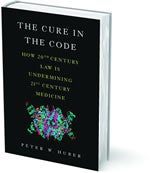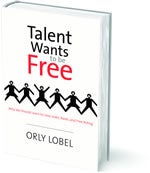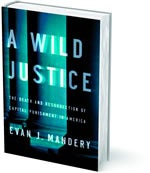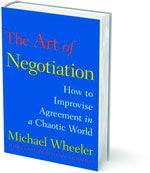“Life After Law: Finding Work You Love with the J.D. You Have,” by Liz Brown ’96 (Bibliomotion)

Brown uses her own example—after leaving a law partnership upon the birth of her daughter, she is now a professor of business law—and those of many others, from a jewelry designer to a nurse to a rabbi, to show the possibilities for those who are unhappy with the practice of law. Such a change is not easy, but a lawyer’s skills can be reframed and refreshed, she says, adding that she has never met a former lawyer who regrets having left the profession.
“The Cure in the Code: How 20th Century Law Is Undermining 21st Century Medicine,” by Peter W. Huber ’82 (Basic Books)

A revolution in molecular science has begun, and it holds the promise of controlling any disease through the manipulation of biochemical code, writes Huber, a senior fellow at the Manhattan Institute for Policy Research. Yet the promise is tempered by the reality of centrally managed and funded medicine that stifles innovation, he contends. Instead, he calls for “adopting policies that allow biochemists, doctors, and patients enough flexibility to confront and collaborate to master the complexities of biochemical reality.” He argues that market forces, which propelled the computer revolution, can also revolutionize our understanding of the code of life itself.
“Talent Wants to Be Free: Why We Should Learn to Love Leaks, Raids, and Free Riding,” by Orly Lobel S.J.D. ’06 (Yale)

Lobel, a professor of law at the University of San Diego, argues that the common practice of restricting talent stifles innovation, hurting both businesses and their employees. The book examines the practices of industry giants such as Google, Coca-Cola, and JetBlue to show that attempts to control human and intellectual capital backfire. It also includes original research indicating that people’s motivation diminishes when they lose ownership of their skills. The lesson for business, she writes, is that “the way to gain is often by allowing tactical loss.”
“A Wild Justice: The Death and Resurrection of Capital Punishment in America,” by Evan J. Mandery ’92 (Norton)

In 1962, opponents of capital punishment, including a young law clerk named Alan Dershowitz, launched a campaign that would culminate in triumph, with a Supreme Court ruling striking down the death penalty in 1972. Of course, that is not the end of the story. The author, an associate professor at John Jay College of Criminal Justice, tells the whole story, of an unlikely victory against a long-accepted punishment and the reversal that followed on its heels. The book examines the key cases as well as the lawyers and justices who shaped them.
“Reflections on Judging,” by Richard A. Posner ’62 (Harvard)

A federal court of appeals judge for more than three decades, Posner taps his own experience for a broader look at the philosophy of judging. In particular, he critiques the legal formalism that he says has needlessly complicated the judicial process. Calling himself a “pragmatic judge,” he supports the realist tradition in judging exemplified by such notables as John Marshall, Oliver Wendell Holmes Jr. LL.B. 1866 and Louis Brandeis LL.B. 1877. Yet today, he says, judges too often “use a complex style of legal analysis … to resolve cases without having to understand factual complexities.”
“The Art of Negotiation: How to Improvise Agreement in a Chaotic World,” by Michael Wheeler LL.M. ’74 (Simon & Schuster)

The hallmark of any negotiation is uncertainty, and the author lays out techniques to manage that uncertainty to achieve success. Diverging from both the “win-win” model of “Getting to Yes” as well as a hard-nosed “win-at-all-cost” negotiating strategy, the book shows the importance of agility and flexibility through many examples of negotiations taking unpredictable paths. Wheeler, a professor at Harvard Business School, also examines the attributes of successful negotiators and ethical issues that arise during the process. To negotiate well, he says, is to embrace chaos.